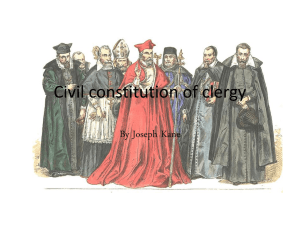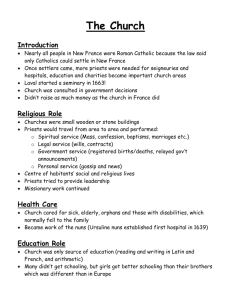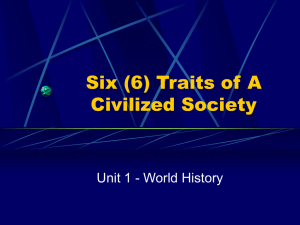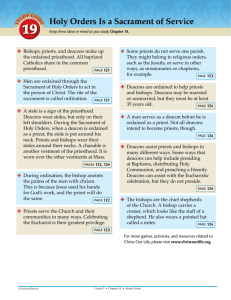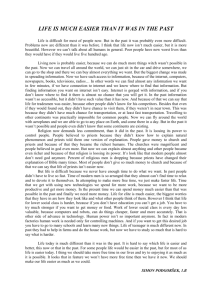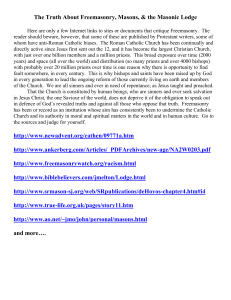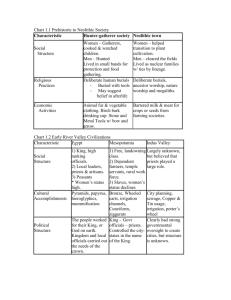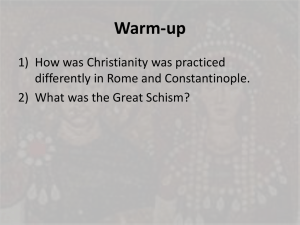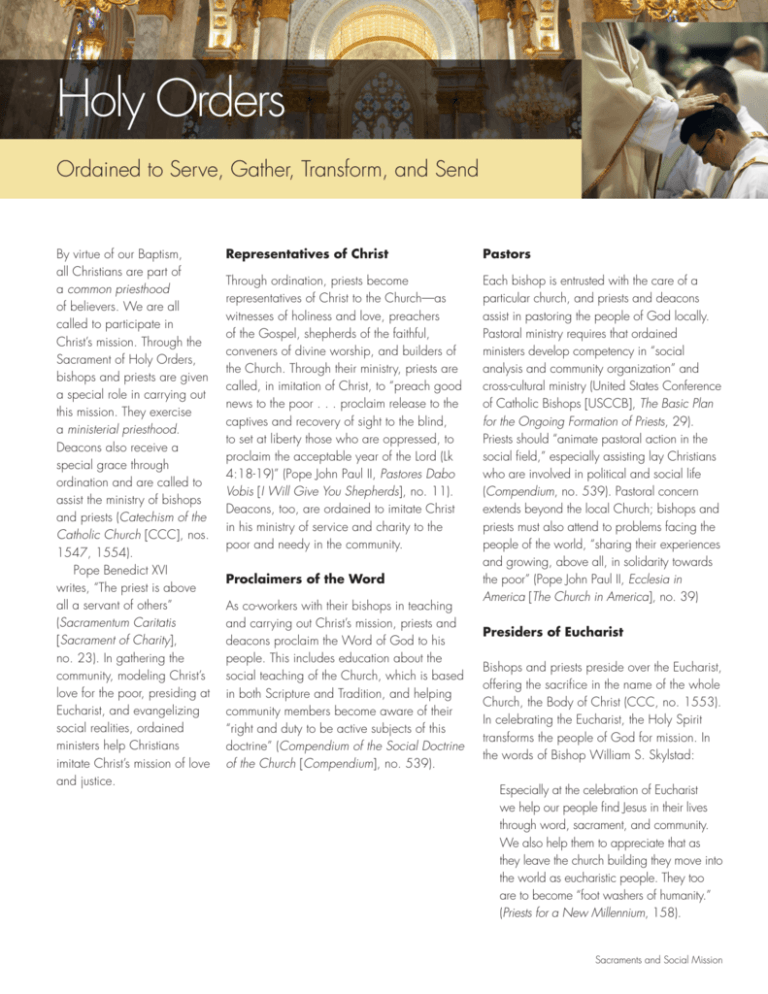
Holy Orders
Ordained to Serve, Gather, Transform, and Send
By virtue of our Baptism,
all Christians are part of
a common priesthood
of believers. We are all
called to participate in
Christ’s mission. Through the
Sacrament of Holy Orders,
bishops and priests are given
a special role in carrying out
this mission. They exercise
a ministerial priesthood.
Deacons also receive a
special grace through
ordination and are called to
assist the ministry of bishops
and priests (Catechism of the
Catholic Church [CCC], nos.
1547, 1554).
Pope Benedict XVI
writes, “The priest is above
all a servant of others”
(Sacramentum Caritatis
[Sacrament of Charity],
no. 23). In gathering the
community, modeling Christ’s
love for the poor, presiding at
Eucharist, and evangelizing
social realities, ordained
ministers help Christians
imitate Christ’s mission of love
and justice.
Representatives of Christ
Pastors
Through ordination, priests become
representatives of Christ to the Church—as
witnesses of holiness and love, preachers
of the Gospel, shepherds of the faithful,
conveners of divine worship, and builders of
the Church. Through their ministry, priests are
called, in imitation of Christ, to “preach good
news to the poor . . . proclaim release to the
captives and recovery of sight to the blind,
to set at liberty those who are oppressed, to
proclaim the acceptable year of the Lord (Lk
4:18-19)” (Pope John Paul II, Pastores Dabo
Vobis [I Will Give You Shepherds], no. 11).
Deacons, too, are ordained to imitate Christ
in his ministry of service and charity to the
poor and needy in the community.
Each bishop is entrusted with the care of a
particular church, and priests and deacons
assist in pastoring the people of God locally.
Pastoral ministry requires that ordained
ministers develop competency in “social
analysis and community organization” and
cross-cultural ministry (United States Conference
of Catholic Bishops [USCCB], The Basic Plan
for the Ongoing Formation of Priests, 29).
Priests should “animate pastoral action in the
social field,” especially assisting lay Christians
who are involved in political and social life
(Compendium, no. 539). Pastoral concern
extends beyond the local Church; bishops and
priests must also attend to problems facing the
people of the world, “sharing their experiences
and growing, above all, in solidarity towards
the poor” (Pope John Paul II, Ecclesia in
America [The Church in America], no. 39)
Proclaimers of the Word
As co-workers with their bishops in teaching
and carrying out Christ’s mission, priests and
deacons proclaim the Word of God to his
people. This includes education about the
social teaching of the Church, which is based
in both Scripture and Tradition, and helping
community members become aware of their
“right and duty to be active subjects of this
doctrine” (Compendium of the Social Doctrine
of the Church [Compendium], no. 539).
­
Presiders of Eucharist
Bishops and priests preside over the Eucharist,
offering the sacrifice in the name of the whole
Church, the Body of Christ (CCC, no. 1553).
In celebrating the Eucharist, the Holy Spirit
transforms the people of God for mission. In
the words of Bishop William S. Skylstad:
Especially at the celebration of Eucharist
we help our people find Jesus in their lives
through word, sacrament, and community.
We also help them to appreciate that as
they leave the church building they move into
the world as eucharistic people. They too
are to become “foot washers of humanity.”
(Priests for a New Millennium, 158).
Sacraments and Social Mission
In other words, through presiding
over the Eucharist, priests help Christians
to “live their social commitment” as a
fruit of their worship (Compendium,
no. 539).
Builders of Community
Ordained ministry is a reminder of our
“communitarian” nature, because it can
only be carried out in communion with
others. For example, priests minister in
communion with their bishop, with other
priests, and with the lay faithful. An
important role of the priest is to bring
together the entire community both in
worship and in building the Church in
the world. Being “a man of communion”
means that a priest must be “a man
of mission and dialogue,” working for
unity, justice, and peace with other
faiths, people of good will, and with
those who are poor and vulnerable
(Pastores Dabo Vobis, nos. 17, 18).
Missionaries
Pope John Paul II notes, “All priests
must have the mind and the heart
of missionaries,” whether they serve
near their home or across the world
(Redemptoris Missio [On the Permanent
Validity of the Church’s Missionary
Mandate], no. 67). Priests can
have missionary hearts through their
attentiveness to the struggles of their
brothers and sisters across the world
and by remembering “the whole Church
for all of humanity” in their prayers and
in the Eucharistic sacrifice (ibid.). This
global perspective must be contagious;
priests must work to “form the community
entrusted to them as a truly missionary
community” (Pastores Dabo Vobis, no.
32). Deacons, too, have been sent by
Christ and play an important role in
bringing him to the heart of the parish
community and beyond.
Servants
St. John Vianney wrote, “The priesthood
is the love of the heart of Jesus.”
Likewise, St. Augustine noted that the
priesthood is the office of the good
shepherd who offers his life for his
sheep. In sum, “the priest is above
all a servant of others” (Sacramentum
Caritatis, no. 23). As Christ “emptied
himself” (Phil 2:7) to become the
suffering servant, so too, priests give
themselves in service for the Church and
the world. The celibate lifestyle, which
encourages an undivided heart in those
committed to it, fosters such self-emptying
service. Deacons also exemplify service
as they assist the bishop and priests in
their ministries and dedicate themselves
to ministries of charity (CCC, no. 1571).
Advocates for the Poor
Ordained ministers are guided by the
Holy Spirit to have “a preferential love
for the poor, the sick, and the needy”
and to identify with Christ the priest and
victim (CCC, no. 1586). This special
obligation to the poor and weak is
in imitation of Jesus’ own love for the
poor and ministry to the sick and dying
(Presbyterorum Ordinis [Decree on the
Ministry and Life of Priests], no. 6).
Counter-Witnesses
The ordained are to live in the world
while also being witnesses representing
virtues that lead the sheep to the one
true sheepfold. These virtues include
love, goodness, and “careful attention to
justice” (Presbyterorum Ordinis, no. 3).
Sharers of Catholic Social
Teaching
Because the Church’s social doctrine
is an “essential component” of the
“new evangelization” (Pastores Dabo
Vobis, no. 54), those preparing for the
ordained ministry should develop a
“thorough knowledge” of Catholic social
teaching and “a keen interest in the
social issues of their day” (Compendium,
no. 533).
Evangelizers of Social Realities
Bishops, assisted by priests, deacons,
and religious, must “evangelize social
realities” (Compendium, no. 539) by
being “articulate spokesmen for and
interpreters of Catholic social teaching
in today’s circumstances” (USCCB,
Program of Priestly Formation, no. 345).
Copyright © 2013, United States Conference of
Catholic Bishops, Washington, DC. All rights reserved.
Permission is hereby granted to duplicate this work without
adaptation for non-commercial use.
QUESTION FOR REFLECTION
How does this reflection help you to better understand the role of the bishop, priest, or deacon?
Learn about the other sacraments! Visit “Resources and Tools” at www.usccb.org/jphd.


